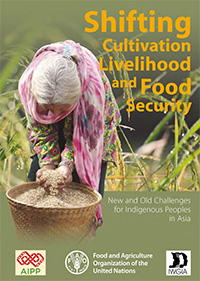Shifting cultivation, livelihood and food security: new and old challenges for indigenous peoples in Asia
 In August 2010 the FAO adopted a policy on indigenous and tribal peoples in order to ensure the relevance of its efforts to respect, include, and promote indigenous people’s related issues in its general work. This publication is an outcome of a regional consultation held in Bangkok, Thailand in November 2013. It documents seven case studies which were conducted in Bangladesh, Cambodia, India, Indonesia, the Lao People’s Democratic Republic, Nepal and Thailand to take stock of the changes in livelihood and food security among indigenous shifting cultivation communities in South and Southeast Asia against the backdrop of the rapid socio-economic transformations currently engulfing the region. The case studies identify external – macro-economic, political, legal, policy – and internal – demographic, social, cultural – factors that hinder and facilitate achieving and sustaining livelihood and food security. The case studies also document good practices in adaptive changes among shifting cultivation communities with respect to livelihood and food security, land tenure and natural resource management, and identify intervention measures supporting and promoting good practices in adaptive changes among shifting cultivators in the region.
In August 2010 the FAO adopted a policy on indigenous and tribal peoples in order to ensure the relevance of its efforts to respect, include, and promote indigenous people’s related issues in its general work. This publication is an outcome of a regional consultation held in Bangkok, Thailand in November 2013. It documents seven case studies which were conducted in Bangladesh, Cambodia, India, Indonesia, the Lao People’s Democratic Republic, Nepal and Thailand to take stock of the changes in livelihood and food security among indigenous shifting cultivation communities in South and Southeast Asia against the backdrop of the rapid socio-economic transformations currently engulfing the region. The case studies identify external – macro-economic, political, legal, policy – and internal – demographic, social, cultural – factors that hinder and facilitate achieving and sustaining livelihood and food security. The case studies also document good practices in adaptive changes among shifting cultivation communities with respect to livelihood and food security, land tenure and natural resource management, and identify intervention measures supporting and promoting good practices in adaptive changes among shifting cultivators in the region.
